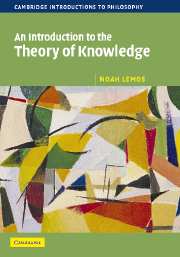Book contents
- Frontmatter
- Contents
- Preface
- 1 Knowledge, truth, and justification
- 2 The traditional analysis and the Gettier problem
- 3 Foundationalism
- 4 The coherence theory of justification
- 5 Reliabilism and virtue epistemology
- 6 Internalism, externalism, and epistemic circularity
- 7 Skepticism
- 8 The problem of the criterion
- 9 The a priori
- 10 Naturalized epistemology
- Select bibliography
- Index
5 - Reliabilism and virtue epistemology
- Frontmatter
- Contents
- Preface
- 1 Knowledge, truth, and justification
- 2 The traditional analysis and the Gettier problem
- 3 Foundationalism
- 4 The coherence theory of justification
- 5 Reliabilism and virtue epistemology
- 6 Internalism, externalism, and epistemic circularity
- 7 Skepticism
- 8 The problem of the criterion
- 9 The a priori
- 10 Naturalized epistemology
- Select bibliography
- Index
Summary
In this chapter, we shall look at a fairly simply form of reliabilism and a form of “virtue epistemology.” Reliabilism holds, roughly, that whether a belief is epistemically justified is a function of its being the product of a reliable cognitive process. Virtue epistemologists hold, roughly, that a belief enjoys the positive epistemic status of being “apt” if it is the product of a truth conducive intellectual virtue. Both reliabilism and virtue epistemology maintain that beliefs enjoy some positive epistemic status, “justification” or “aptness,” in virtue of being the product of some truth conducive source, either a reliable process or an intellectual virtue.
Reliabilism
In his 1979 essay “What is Justified Belief?” Alvin Goldman provides us with an early and important version of reliabilism. He contrasts “faulty” belief producing processes, processes that typically produce unjustified beliefs, with those that typically produce justified belief. According to Goldman, faulty belief producing processes include such things as confused reasoning, wishful thinking, reliance on emotional attachment, mere hunch, guesswork, and hasty generalization. In contrast, justification conferring processes include standard perceptual processes, remembering, good reasoning, and introspection. Goldman notes that the faulty processes have something in common: “They share the feature of unreliability. They tend to produce error a large proportion of the time.” On the other hand, the justification conferring processes appear to share the feature of reliability. The beliefs that they produce are generally true.
- Type
- Chapter
- Information
- An Introduction to the Theory of Knowledge , pp. 85 - 107Publisher: Cambridge University PressPrint publication year: 2007

